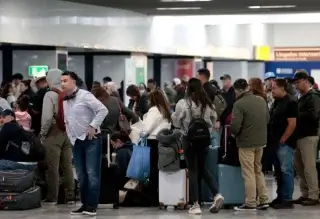read also
Global Luxury Hospitality Report: the Republic of Georgia Emerges as a Key Player

The Global Investment Group has unveiled its latest report, Luxury Hospitality in Georgia and Global Trends, indicating that the Republic of Georgia is rapidly positioning itself as a premier destination in the global luxury resort market. The experts predict that Georgia is poised to become a leader in this sector.
On a global scale luxury and all-inclusive hotel properties, particularly those operated by major international brands, are demonstrating significant growth. The key metrics such as profitability and occupancy rates in these segments are rising at a faster pace than in the broader market. The report further underscores the increasing share of online bookings and the growing significance of loyalty programs.
The investment firms, funds, and private investors are increasingly focusing on the all-inclusive segment, recognizing its potential for strong returns. These investors are actively directing capital towards it. The study also notes that international hotel brands command the highest level of consumer confidence.
Global Market Overview
The global hospitality and resort sector is valued at approximately $1 trillion, encompassing over 742,000 establishments worldwide and employing more than 10.4 million people. This sector represents around 10% of global GDP.
In 2023 the key profitability metric, Revenue Per Available Room (RevPAR), demonstrated a robust recovery despite the global financial crisis and persistent geopolitical tensions in regions such as Ukraine, Azerbaijan, Armenia, Israel, and the Middle East. Major players like Wyndham Hotels & Resorts and Marriott Hotels & Resorts reported a 3% increase in global RevPAR for 2022. Projections for 2024 indicate a further 4% rise, primarily driven by elevated average daily rates (ADR).
The average stay length in the global hotel industry has reached 1.93 days. Demand patterns show variability, with short-term business trips and extended vacations to resort hotels. The latter sees travelers staying on average for eight days.
Hotels generate revenue through five primary channels: Booking.com, Expedia, direct bookings via hotel websites, Agoda, and Airbnb. The resort hotels, in particular, depend significantly on revenue from package tours arranged by travel operators.
Europe
The European hotel market is projected to see revenue growth, with forecasts suggesting it will reach $113.4 billion by 2024. The experts anticipate that by 2028 the number of users in the European market will increase to 293.1 million, with average revenue per user (ARPU) at $410. Notably, the online sales are anticipated to generate 86% of total revenue in the hotel sector by 2028.
From 1983 to 2023 the global supply of luxury hotel rooms has roughly tripled. Over the same period, the supply of ultra-luxury hotels worldwide has increased fivefold. In the past 40 years the number of brands and luxury hotel rooms has surged by over one million. This segment has transitioned from a niche market to a rapidly expanding sector, driven by institutional investment.
The luxury hotel market is divided into branded and independent categories. The branded international hotels dominate the luxury segment offering high-quality services, loyalty programs, and booking services that foster repeat clientele.
Luxury hotels across the Eurasian continent are expected to exhibit the highest growth in revenue and occupancy rates over the next eight years.
The European hotel market is poised for revenue growth with forecasts predicting it will reach $113.4 billion by 2024. The experts believe that by 2028 the number of users in the European market is expected to rise to 293.1 million, with average revenue per user (ARPU) estimated at $410. Notably, online sales are projected to account for 86% of total revenue in the hotel sector by 2028.
The Luxury Segment: Growth in Volume, Profit, and Demand
The analysts forecast that between 2024 and 2028 the luxury hotel market will grow by approximately 5.9% annually. Over the past 30 years the luxury hotel market has expanded by 191% by assessment. By 2032 the global luxury hotel market is expected to reach $369.36 billion with an average annual growth rate of 11.5% from 2024 to 2032.
In 2023 the mid-tier hotel segments led the recovery of RevPAR. However, in 2024 the greatest growth is expected in the luxury and upper-upscale segments, fueled by a sharp rise in business and group travel.
The occupancy rates for luxury hotels in the UK stood at 73% at the end of 2023. A similar figure is reported for the luxury segment in Dubai with an occupancy rate of 74%. This compares with a global average occupancy rate of 69% across all hotel segments.
The growing importance of travel and leisure among affluent individuals, particularly those with incomes above $500,000 per year, is another key driver of the luxury and all-inclusive segments. For these travelers, luxury experiences are increasingly seen as essential.
The growth of the luxury and all-inclusive segments is also driven by the increasing importance of travel and tourism for respondents with annual incomes exceeding $500,000. This affluent group of travelers considers travel to be one of their fundamental needs.
Тренд роста коснётся и других регионов. В частности, загрузка сетевых люксовых отелей США демонстрирует рост в 2% на 2023 год. Ежегодный рост загрузки от 2% и более ожидается минимум до 2027 года. Причины — рост уровня услуг и качества сервиса в отелях этого сегмента.
Hotel occupancy is expected to rise again in 2024, particularly in the luxury segment
In 2023 the hotel occupancy surged with rates exceeding 80-85% in many European destinations during the summer, compared to an average of 73.8% for luxury hotels in Europe in 2019. Projections for 2024 indicate a further global occupancy increase of 2.5%. However, major cities are expected to see significantly higher growth, with occupancy rates rising by 17.5%. The luxury and upper-upscale segments are forecast to experience the most substantial growth in 2024.
For comparison, by the end of 2023 the luxury hotel occupancy in the UK reached 73%, and in Dubai it stood at 74%. The luxury hotels in Israel surpassed the global average in 2022, reaching 75% occupancy. In Turkey, despite an oversupply, the five-star hotels maintained occupancy levels above 70% in 2023, peaking at nearly 90% during the high season. Spain's luxury segment recorded a 69% occupancy rate in 2023, while Italy saw 71%.
This upward trend is expected to extend to other regions. In the U.S. the occupancy rates for branded luxury hotels showed a 2% increase in 2023, with annual growth of 2% or more anticipated at least until 2027, driven by improvements in service levels and quality in this segment.
The Republic of Georgia and the Black Sea Region: Emerging Markets Set for Expansion
The Georgian hospitality market is showing impressive growth compared to other emerging markets, with trends in neighboring Black Sea regions offering insights into the future development of Georgia's luxury hotel sector.
In Russia’s Krasnodar territory the number of all-inclusive hotels increased 2.5-fold from 2018 to 2022, before the exit of international hotel chains. The occupancy rates for all-inclusive Black Sea hotels in Russia are 15% higher during the low season and 20% higher during the peak season compared to non-all-inclusive hotels. During the peak season the occupancy rates for all-inclusive hotels in this region remain above 95%.
In Bulgaria the average annual occupancy rate for hotels of all categories, from hostels to luxury, was 55.9% in 2023. However, for large high-end hotels (with over 250 rooms) the average annual occupancy rate was 71.6%. The prices in Bulgarian hotels across all categories are expected to increase by 10-20% in 2024.
Georgia is outpacing other leading global tourist destinations in terms of tourism growth. The revenues from tourism is forecast to reach a record $4.5 billion in 2024 reflecting a 10% annual increase. This surge in tourism revenue is exceeding the growth in visitor numbers, signaling a shift towards more affluent travelers. It highlights a growing preference for high-quality upscale accommodations over budget options.
Demand for Premium Hotels Remains Robust
In 2023 the premium hotels achieved an average occupancy rate of 58%, with peak season rates surpassing 90%. A further uplift in occupancy, estimated at no less than 4%, is anticipated for 2024.
In 2022 the major global hotel chains—Marriott Hotels & Resorts, Wyndham Hotels & Resorts, Inc., Hilton Hotels & Resorts, among others—expressed interest in Batumi’s luxury hotel market. By March 2023 the occupancy rates for premium hotels in Georgia had exceeded those of 2019. The experts consider the growing demand for premium and luxury categories a long-term trend likely to persist over the next decade.
In the Ajara region the branded hotels maintain occupancy rates above 90% during peak season (June to September), with demand for high-quality service increasing each year. Batumi boasts over 2,400 accommodation options, but only 174 are hotels (mostly mid-range and budget) with just 7 affiliated with major international chains.
As a result, unmet demand for premium and luxury accommodations drives high occupancy rates and elevated prices, a trend projected to continue long-term. The market is unlikely to see sufficient premium and luxury hotel additions from international brands to meet demand over the next decade.
In summer 2024 a night at the Sheraton is priced from $356, while a standard room at the Ramada Plaza starts at $217. These rates are considerably lower—2 to 10 times—than those in the luxury segment, where prices range from $450 to $700 per night and can exceed $700 to $1000 for standard rooms during peak season. Presidential suites at top-tier hotels are priced from $1000 to $1700 per night comparable to an ordinary suite in several leading global luxury hotels.
The market is critically underserved in luxury and resort formats. Currently Georgia's hospitality sector lacks all-inclusive and luxury options from international brands. Given the high and stable demand, the introduction of such properties would likely result in occupancy rates reaching 90-100% during peak seasons due to the current shortage.
The high demand for luxury and all-inclusive accommodations is reflected in market inquiries, the occupancy rates at branded and premium hotels, and the regional trends, including those in neighboring Black Sea markets such as Turkey, Bulgaria, and Russia.
Take, for instance, the Paragraph Resort & Spa Shekvetili, Autograph Collection—the sole branded resort on Georgia’s coast. During peak season, a standard room at this highly regarded property starts at $400 per night, with breakfast included but no all-inclusive option. Despite its impressive standards, this hotel does not fall into the luxury category, unlike the Paragraph Luxury Collection in Tbilisi.
With high demand for luxury accommodations in Georgia, there is currently only one luxury example: the Paragraph Luxury Collection city hotel in Tbilisi. The rooms at this hotel start at $450 to $500 per night, with breakfast charged separately. As a city hotel it does not offer all-inclusive options. When fully operational all-inclusive and ultra all-inclusive services are introduced, the room rates are expected to align with or surpass those of global luxury brands and Turkish counterparts, starting at approximately $700 per night.
Georgia is following global trends in the global hospitality market with its accommodation prices and demand for tourism services aligning with those of other Black Sea resorts and several Mediterranean destinations. The shortage of luxury accommodations suggests that once luxury all-inclusive hotels from the international brands enter the market, the prices and occupancy rates are likely to exceed those seen in neighboring Bulgaria, Turkey, and Russia.
Turkey’s all-inclusive sector, which evolved over approximately 50 years, now features over 5,000 establishments across various formats and standards, including numerous branded hotels. During peak season, average nightly rates range from $700 to $1,000, with luxury options commanding between $2,000 and $9,000, reflecting sustained demand. For instance, Akra Fethiye Tui Blue Sensatori offers an ultra all-inclusive family room for €1,508, while Wome Prime Hotel’s halal all-inclusive rates start at €1,460.
In Georgia the all-inclusive model from luxury brands is in its infancy and is expected to grow over the next decade. However, the substantial investment and extensive land requirements needed for such developments mean that the market will likely see no more than a dozen of these establishments over the next 20 years. As a result, demand for all-inclusive options is expected to remain largely unmet, with only 5 to 7 properties anticipated in the coming decade.
Due to the absence of similar properties on the market the experts predict that nightly rates for these rooms will start at $600 in the low season and $900 during peak times. The rooms in higher categories are anticipated to be priced from $700 in the off-peak season to $1,000 in the high season. While this offering may not attract mass-market demand, the niche segment of discerning and affluent travelers is expected to sustain occupancy rates of at least 70% throughout the year.
The Subtle Ways Hotel Loyalty Programmes Drive Profitability
There is a clear reason why 94% of the world’s 100 largest hotel brands and chains have loyalty programmes: they are highly effective at increasing revenue. The loyal customers spend 22.4% more and stay 28% longer. Business travelers account for 64% of loyalty programme members, who contribute between 30% and 60% of room revenue.
For example, in 2023, the loyal guests of Wyndham Hotels & Resorts, Inc. had access to over 9,000 hotels worldwide under 24 brands through their loyalty programme. According to a survey by the Global Hotel Alliance—the world’s largest hotel alliance, comprising Kempinski, Pan Pacific Hotels and Resorts, Rydges Hotels & Resorts, and Wyndham Hotels & Resorts—quality of stay and loyalty programme benefits were identified as the most critical factors in choosing a hotel.
Hospitality Prices Surge, Particularly in the Luxury Sector
Pricing in the hospitality industry is increasingly influenced by brand and hotel classification. For example, Wyndham Hotels & Resorts' luxury brands, such as Grand and Registry Collection, command higher room rates compared to other properties in their portfolio. This trend is evident across various international hotel chains, with global publications now citing nightly rates of $1,300 as the "new normality."
Although there are around 60 million dollar billionaires and millionaires worldwide, their travel spending represents 30% of the market. Within the luxury hospitality sector, their share approaches 70% and is expected to peak in 2024. Meanwhile, 20% of the global population boasts a net worth of at least $42,000. While these individuals may shy away from accommodations exceeding $1,000 per night, they frequently choose five-star hotels priced between $200 and $1,000 per night, indulge in all-inclusive packages, and allocate substantial budgets to their travel experiences.
All-Inclusive Segment Experiences Strongest Growth
All-inclusive holiday packages are sold using an overbooking strategy, akin to those employed by airlines. This method involves selling more packages than the available inventory, anticipating that some reservations will be canceled. This practice, common in the travel and hospitality sectors, ensures maximum occupancy and revenue.
This business model ensures 100% occupancy, maximizing profitability. It is legal and commonly employed worldwide. When more packages are sold than available, the customers are usually offered alternative accommodation, often upgraded or at a partner hotel. The guests of branded networks who are part of loyalty programmes and are regular customers receive priority service and check-in.
Consumers Favour International Brands
The leading global hospitality brands include such major hotel chains as Wyndham, Marriott, Hilton, IHG, Hyatt, Choice Hotels, and Best Western. McKinsey forecasts that the luxury segment within branded hotel networks will grow by at least 6% annually through to 2025. The capital of a brand plays a crucial role in driving the performance of luxury hotels.
The study highlights that brand capital—including brand recognition, image, and loyalty—significantly enhances the market performance within the hospitality sector. Additionally, factors such as brand trust, image, and perceived quality have a pronounced positive impact on overall brand equity in luxury hotels.
As a result, the luxury and all-inclusive segments of global hotel brands are poised for substantial growth over the next decade. This expansion will affect demand, revenue, occupancy, and profitability. Surveys and forecasts suggest a corresponding rise in investor interest and investment in these high-end properties.
Conclusions
1. The global real estate industry is witnessing a long-term trend towards growth in key metrics within the luxury and all-inclusive hotel segments, as well as among international hotel brands.
2. Online bookings are increasing at a faster rate within the luxury segment compared to the industry as a whole.
3. The loyalty programmes offered by the branded hotel chains are a significant competitive advantage and are expected to further strengthen the market positions of leading global brands over the long term.
4. North America, Western Europe, the Middle East, and the Caucasus region (with Georgia as a standout market) continue to be the leaders in growth.
5. Major revenue sources in the hospitality industry remain online booking services such as Booking.com, Expedia, hotel websites (direct bookings), Agoda, and Airbnb.
6. In the resort segment, the packaged tours from tour operators are the largest source of revenue both currently and in the long term.
7. The anticipated arrival of luxury hotels offering all-inclusive services under international brands in Georgia is set to position the country ahead of current benchmarks—occupancy, pricing, and for investors, profitability, asset appreciation, and liquidity—established by leading Black Sea destinations such as Turkey, Egypt, Bulgaria, and Russia over the next decade.
8. The Georgian market is currently oversaturated with budget accommodation options, while there is a significant deficit in premium offerings and a lack of luxury options. This defines the main trend for the long-term development of the industry. In the premium segment, which is currently underrepresented in Georgia, the cost of accommodation is expected to rise within a range of $100 to $400 per night. For new international luxury hotel brands entering the market, anticipated rates could range from $500 to $5,000–6,000 per night, depending on service levels and exclusive VIP conditions.
The full text of the study is available here.








